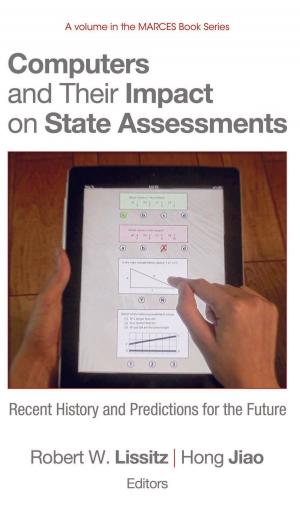Using Data in Schools to Inform Leadership and Decision Making
Nonfiction, Reference & Language, Education & Teaching, Educational Theory, Leadership| Author: | ISBN: | 9781623967888 | |
| Publisher: | Information Age Publishing | Publication: | November 1, 2014 |
| Imprint: | Information Age Publishing | Language: | English |
| Author: | |
| ISBN: | 9781623967888 |
| Publisher: | Information Age Publishing |
| Publication: | November 1, 2014 |
| Imprint: | Information Age Publishing |
| Language: | English |
Our fifth book in the International Research on School Leadership series focuses on the use of data in schools and districts as useful information for leadership and decision making. Schools are awash in data and information, from test scores, to grades, to discipline reports, and attendance as just a short list of student information sources, while additional streams of data feed into schools and districts from teachers and parents as well as local, regional and national policy levels. To deal with the data, schools have implemented a variety of data practices, from data rooms, to data days, data walks, and data protocols. However, despite the flood of data, successful school leaders are leveraging an analysis of their school’s data as a means to bring about continuous improvement in an effort to improve instruction for all students. Nevertheless, some drown, some swim, while others find success. Our goal in this book volume is to bring together a set of chapters by authors who examine successful data use as it relates to leadership and school improvement. In particular, the chapters in this volume consider important issues in this domain, including: • How educational leaders use data to inform their practice. • What types of data and data analysis are most useful to successful school leaders. • To what extent are data driven and data informed practices helping school leaders positively change instructional practice? • In what ways does good data collection and analysis feed into successful continuous improvement and holistic systems thinking? • How have school leadership practices changed as more data and data analysis techniques have become available? • What are the major obstacles facing school leaders when using data for decision making and how do they overcome them?
Our fifth book in the International Research on School Leadership series focuses on the use of data in schools and districts as useful information for leadership and decision making. Schools are awash in data and information, from test scores, to grades, to discipline reports, and attendance as just a short list of student information sources, while additional streams of data feed into schools and districts from teachers and parents as well as local, regional and national policy levels. To deal with the data, schools have implemented a variety of data practices, from data rooms, to data days, data walks, and data protocols. However, despite the flood of data, successful school leaders are leveraging an analysis of their school’s data as a means to bring about continuous improvement in an effort to improve instruction for all students. Nevertheless, some drown, some swim, while others find success. Our goal in this book volume is to bring together a set of chapters by authors who examine successful data use as it relates to leadership and school improvement. In particular, the chapters in this volume consider important issues in this domain, including: • How educational leaders use data to inform their practice. • What types of data and data analysis are most useful to successful school leaders. • To what extent are data driven and data informed practices helping school leaders positively change instructional practice? • In what ways does good data collection and analysis feed into successful continuous improvement and holistic systems thinking? • How have school leadership practices changed as more data and data analysis techniques have become available? • What are the major obstacles facing school leaders when using data for decision making and how do they overcome them?















